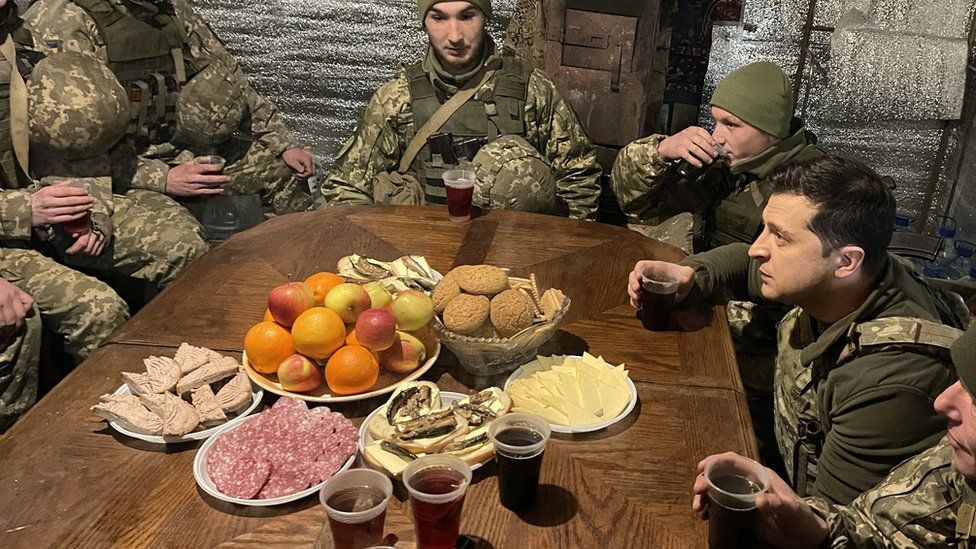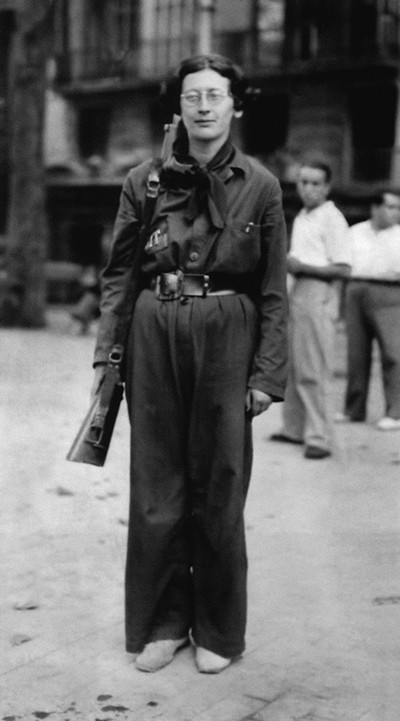by Riley Clare Valentine
The principle of war is simple—you do not matter.[1] Simone Weil put forward this scathing criticism of the State and violence. The State is the bedrock upon which all violence is grounded. The responses to the violence of the State are often countered by claims that they violate individuals rights. While the UN and other multinational organizations like Human Rights Watch use these assertions of war to hold rogue nations like Russia accountable, the individualist nature of their framing actually restricts human rights.[2]
Weil writes in the essay “Human Personality” that “at the bottom of the heart of every human being, from earliest infancy until the tomb, there is something that goes on indomitably expecting, in the teeth all experience of crimes committed, suffered, and witnessed, that good and not evil will be done to him. It is this above all that is sacred in every human being.”[3] Her focus on the sacred is grounded in Catholic teaching, which centers the collective over the individual. The community is more important than a single person. What makes each person sacred, as Weil notes, is their belief that their community will not harm them. Force, she writes in an analysis of the Iliad, boils a person down into a thing—“this person becomes a corpse before anybody or anything touches him.”[4] Violence has the ability to transform a person into an already-dead thing before they have died. As arbiters and vehicles of violence, States turn even their own citizens into these living corpses while their political leaders harm communities they see as things for their own financial and political gain.

We see this violence play out today in the Russian Ukraine war.[5] Ukraine’s president Volodymyr Zelenskyy gave an address to the Russian folk February 23, 2022, “we are ready to have talks with anybody, including you, in any format, on any platform. The war will deprive [security] guarantees from everybody—nobody will have guarantees of security any more. Who will suffer the most from it? The people. Who doesn’t want it the most? The people!”[6] The people will suffer most from a war between Russia and Ukraine. The people do not want it.
Zelenskyy elevates the cries of the Ukrainian people to the world-stage. In Weil’s words—“I see a passer-by in the street. He has long arms, blue eyes, and a mind whose thoughts I do not know, but perhaps they are commonplace. It is neither his person, nor the human personality in him, which is sacred to me. It is he. The whole of him.”[7] Zelenskyy’s words draw attention to this commonplaceness in Weil’s work. The everyday person is the one who will suffer and who opposes this war. If we employ Weil the universal characteristics which make up a person—their innocent belief of a life free from violence, their soul, their ability to exist and feel with others—these factors are what motivate us to solidarity with the Ukrainian people. Weil argues that criticisms of the State are not solely personal, in that they are not grounded in a singular experience, but reflect an overall damage to the human soul and community. “When the infliction of evil provokes a cry of sorrowful surprise from the depths of the soul,” she writes, “it is not a personal thing. Injury to the personality and its desire is not sufficient to evoke it.”[8] Outcries of suffering come from a violation of universal collective principles of justice, from our collective trust and care for one another.
The cry against violence is often incoherent. It may even be silent if a person has experienced repeated acts of harm, but the cry is never dead. It will always exist, and even if it is expressed solely internally, we must listen because the powerful who pursue war and violence do not hear these cries. Weil argues, “a political party busily seeking, or maintaining itself in power can discern nothing in these cries except a noise…it can never be capable of the tender and sensitive attention which is needed to understand its meaning.”[9] The form of solidarity that Weil asks us to follow is borderless and anarchist. We must reject the war machine regardless of nationality, and we must do so because war turns our cries into noise. War does not only harm Ukrainians or Russians. War also harms all other people who are drawn into battle and undermines our collective sense of stability and well-being. Individuals may turn away from the afflicted, to use Weil’s language, and continue to harm them, yet in harming others, they harm themselves. They must “cut out the tongue” of the afflicted and no longer hear them. They damage their soul.

President Zelenskyy asks the Russian people to protest and raise their voices against their governments’ aggression. Zelenskyy’s appeal recognizes that the people of Russia, like the people of Ukraine, do not want this war. It is the powerful who want this war and wish to pursue it. The powerful will profit from this war, as people suffer and die. The answer to war is not to think in narrow terms of rights, which may be quantified and measured out. Rights are dependent upon force. Weil contends that “rights are always asserted in a tone of contention; and when this tone is adopted, it must rely upon force in the background, or else it will be laughed at.”[10]
If our argument against war rests upon rights, there is a silent threat of violence in the background. Instead, an argument against war must recognize the universality of a person. We cannot hurt our neighbors because they hold a form of grace which motivates us to protect them. Let us be moved by a solidarity informed by a universal thirst for justice and protection of the totality of a person and abandon principles which rely upon the very force that a rejection of war requires.
Weil argues that force turns humans into contradictions—the living dead, “the contradiction lodged within the soul tears it to shreds. This thing is constantly aspiring to be a man or a woman and never achieving it—here, surely, is death but death strung out over a whole lifetime; here, surely is life, but life that death congeals before abolishing.”[11] War creates these contradictions. In order to kill another person, they must already be dead. They cannot be alive. There is no aspect of a human being which war does not harm.

The answer to what we must do in the face of violence is not an easy one. Weil alerts us to the principle of obligation. We are obliged to uphold the good, which comes from that which is sacred within all people—the soul. The good is interconnected to justice and truth. However, we should be wary of political systems as guarantees of the good, because the good exists outside of politics.
Weil as a Christian anarchist offers a prescient critique of war and State violence. We should be skeptical of any call for violence because the moment we participate we transform human beings into living corpses. This sinful violation of the soul demolishes solidarity. Solidarity requires a belief that there is something worth protecting. For Weil, it is our trust in our community, and that community is boundless. We may not be able to trust States, but we can trust our global community as we see a global outcry of the Russia Ukraine conflict. The guarantee that we do have, according to Weil, is that we cannot abandon the afflicted.

Riley Clare Valentine is a Ph.D. Candidate in Political Science at Louisiana State University. Their research revolves around language, politics, and care ethics as a response to neoliberalism. They are an educator.
Further Reading
[1] Simone Weil, “Human Personality,” in: Simone Weil: An Anthology, ed. Siân Miles, London: Virago (1986): 50.
[2] “Russia, Ukraine & International Law: On Occupation, Armed Conflict and Human Rights,” Human Rights Watch, https://www.hrw.org/news/2022/02/23/russia-ukraine-international-law-occupation-armed-conflict-and-human-rights.
[3] Weil, “Human Personality,” 51.
[4] Simone Weil, “The Iliad, or the Poem of Force,” Chicago Review 18, no.2(1965): 7.
[5] This is not to deny that acts of violence are occurring and have been occurring in other parts of the world.
[6] “Russia-Ukraine Crisis: Zelenskyy’s Address in Full,” Al Jazeera, February 24 2022, https://www.aljazeera.com/news/2022/2/24/russia-ukraine-crisis-president-zelenskky-speech-in-full.
[7] Weil, “Human Personality,” 50.
[8] Weil, “Human Personality,” 54.
[9] Ibid., 53.
[10] Weil, “Human Personality,” 61.
[11] Weil, “The Iliad,” 9.


0 comments on “Zombies: Simone Weil on State Violence”